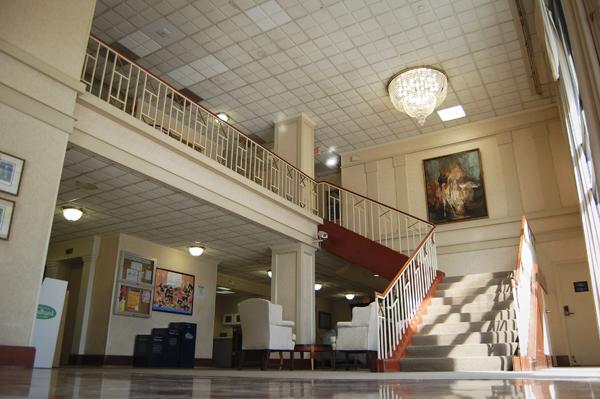The much-maligned residence hall for graduate students, the Hall on Virginia Avenue, will likely be demolished and get a nearly $35 million makeover starting next summer.
The Board of Trustees approved $2 million to plan the building’s new design Friday, paving the way for a more modern residence hall featuring collaborative work space, aimed at drawing top graduate students.
Construction crews will break ground next summer on the historic building that served as a hideout for one of the convicted conspirators in the Watergate scandal. It is expected to be finished by 2016, pending approval from District agencies and another funding green light from the Board of Trustees next year.
The University will dip into its $1.4 billion debt pool to fund the upgrades, details on which are scant, as the designs will just get underway this year.
Executive Vice President and Treasurer Lou Katz said he expects the University to pay off the construction through housing charges. The last batch of residents before the building’s demolition will pay $12,250 next academic year.
In 2011, students circulated a petition calling on administrators to address what they called “poor living conditions.” Residents reported that maintenance crews were slow or unresponsive in addressing issues, ranging from yellow water to rodents in the now-48-year-old building, located at 2601 Virginia Ave.
The renovations will look to appeal to the rising caliber of graduate students that GW is looking to attract, University President Steven Knapp said.
“Traditionally, universities as a whole tend to focus on undergraduate students’ life and experience, and have tended to think of graduate students as belonging to their individual departments and schools,” Knapp said. “That will still be the case, but we can do more to build more of a sense of community.”
Graduate student issues came to a head this year as the University’s student life office failed to find a successful way to support the widely varied group of roughly 10,000 students. The Student Association took up the issue after months of what they called stalled efforts to increase spaces for graduate students and strengthen a sense of community for commuter and part-time students.
The eight-story residence hall will include more common spaces and, while the University is still planning the building’s new look, the 120-unit residence hall of single and double rooms could house a graduate academic community, Katz said, similar to living and learning communities for undergraduates.
“Right now, we’re talking about building the building, and then as it gets closer, they’ll talk about what group of grad students — maybe it’ll be for just two of the schools, or maybe it’ll be for all of the schools,” he said.
The University’s only other graduate resident hall is The Aston, which is available for first-year law students. GW also owns Columbia Plaza apartments, which typically house graduate students.
The University will also spend the year “assessing potential demand for a faculty housing program,” Senior Associate Vice President for Operations Alicia Knight said.
To house students in the building for another year, the Hall will see its carpets repaired or replaced and new light fixtures installed.
– Cory Weinberg contributed to this report.







